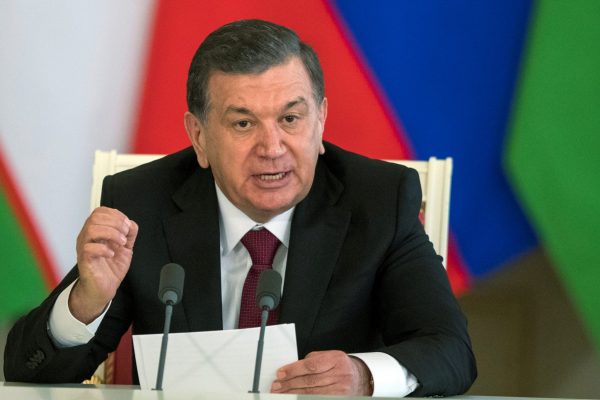He already surprised many with his willingness to break with the past on a plethora of diplomatic, political and economic issues. Yet it remains debatable whether Mirziyoyev values reform in and of itself, which puts a damper on Uzbekistan’s prospects for long-term political and economic liberalisation.
Upon Karimov’s death, the main contenders for the presidency were then prime minister Shavkat Mirziyoyev, then finance minister Rustam Azimov and then head of the National Security Committee Rustam Inoyatov. There was also a threat from Karimov’s younger daughter Lola Karimova-Tillyaeva and her businessman husband Timur Tillyaev.
All the leadership contenders other than Mirziyoyev have been sidelined in the past year. In June 2017, Azimov was dismissed from his position days after being berated by Mirziyoyev for corruption and incompetence. In January 2018, Uzbek authorities cracked down on a Tashkent market controlled by Tillyaev. A month later, Inoyatov was dismissed in the wake of Mirziyoyev’s severe criticism of the security services. Mirziyoyev still has regional elites to balance, but he does not face a united opposition and therefore enjoys significant latitude when it comes to implementing major reforms.
In the international arena, Mirziyoyev has gone on a charm offensive. He worked to resolve his country’s differences with Russia, quietly ending Uzbekistan’s attempt to counter Russian influence in Central Asia. He resumed bus-service links with Kazakhstan, visited Tajikistan, demarcated Uzbekistan’s border with Kyrgyzstan and reversed Uzbekistan’s longstanding opposition to regional cooperation. These moves have a pragmatic purpose: improve Uzbekistan’s regional environment, thereby leaving Mirziyoyev free to focus on domestic reforms — a strategy not unlike former Soviet leader Mikhail Gorbachev’s ‘new thinking’. It helps that Russia and Uzbekistan’s Central Asian neighbours much prefer Uzbekistan’s new constructive approach to regional affairs to the old unilateral one.
Political reforms have been much more limited than those in diplomacy: there has been the release of a few political prisoners, newly given permission to criticise some government policies, greater tolerance toward moderate Islam and the condemnation of arbitrary arrests by security services. These policies have had two predictable effects: discrediting parts of the bureaucracy that might still be loyal to former security chief Inoyatov and establishing enough credibility with Western institutions to gain access to Western credit and investment. While it is too early to tell whether those efforts will succeed, Mirziyoyev managed to push through a liberalisation of rules governing tourist visas — something that was previously blocked by Inoyatov.
Economic reforms have been similarly modest and are aimed at reviving a moribund economy without generating political instability. There are plans to join the WTO, to combat corruption, to limit forced labour and the aforementioned attempt to boost tourism. Most are either aspirational or selectively applied. There is a vision for a more market-friendly Uzbekistan, modelled perhaps on neighbouring Kazakhstan, but there are few details about how that vision could be realised. Mirziyoyev’s ongoing feud with Karimov-era bureaucrats will further stall efforts to turn broad goals into actionable policies.
What degree of transformation can reasonably be expected from Uzbekistan? The best-case scenario is a poorer but more economically diversified version of Kazakhstan. Diplomatically, Uzbekistan has long paid a price for antagonising Russia and pursuing regional dominance. The costs included poor access to Russian and Central Asian markets, lack of support in international arenas and little say on regional matters.
Uzbekistan is likely to abandon any pretence of hedging against Russia and will likely instead seek greater financial and political support for impending reforms. In particular, securing better treatment for Uzbek labour migrants in Russia would be very popular in Uzbekistan even at the price of greater dependence on Russia. As a result, potential for Uzbek regional integration in Central Asia is at its highest since the mid-1990s.
Politically, Mirziyoyev seems to be replacing wholesale censorship and repression with a more targeted approach. The former breeds resentment — which can lead to terrorism — and stifles economic growth. The latter can maintain regime security without incurring those costs. Mirziyoyev is also unsure of the loyalty of the security services, which provides him another incentive to limit their powers. Continued progress does depend on the government’s ability to contain criticism and keep it from affecting Mirziyoyev’s popularity.
Economically, Mirziyoyev understands the need to integrate Uzbekistan into the regional and global economy. Reform will require concrete policies based on best practices, which means replacing the old cadre of bureaucrats with ones who better understand the logic of a market economy. This process has already begun. Reform also means a greater emphasis on Uzbekistan’s nascent private sector, which has reason for optimism in light of Uzbekistan’s recent opening to international financial markets.
Unlike their diplomatic and political counterparts, it will take years to measure the success of Mirziyoyev’s economic reforms. A lot is riding on Mirziyoyev’s ability to harmonise his own political interests with the economic interests of his country.
Gennady Rudkevich is Assistant Professor of Political Science at Georgia College.

